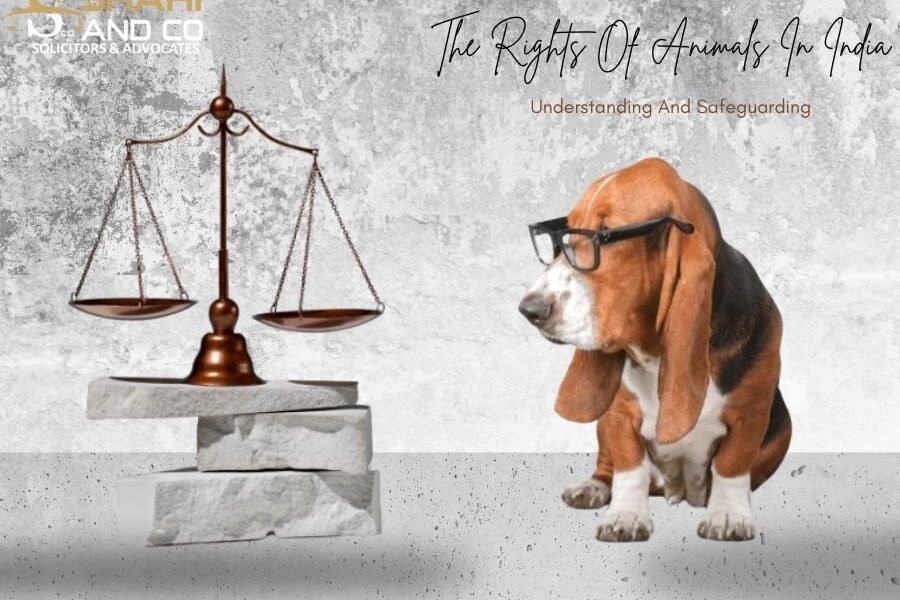The rights of animals in India have gained significant attention over the past few decades, reflecting a growing awareness of animal welfare and ethical treatment. As one of the world’s most biodiverse countries, India is home to numerous species that are integral to its cultural, ecological, and economic fabric. This article delves into the legal framework governing animal rights in India, the challenges faced, and the ongoing efforts to ensure that these rights are respected and upheld.
India, a land steeped in cultural and spiritual diversity, has a long-standing tradition of reverence for animals. However, the nation’s rapid urbanization and economic growth have brought about significant challenges for animal welfare. This article delves into the evolving landscape of rights of animals in India, examining historical perspectives, contemporary issues, and the efforts being made to safeguard their well-being.
ARMAMENTARY PROVISIONS FOR THE RIGHTS OF ANIMALS IN INDIA
Article 51(A) of the Indian Constitution requires the preservation and enhancement of the natural environment and animal welfare. The Article 48A of the Directive Principles of State Policy provides additional support for this essential duty. The 42nd Amendment was introduced in 1976 and included both sections. Although these constitutional requirements are not directly enforceable in court, they may be included within Article 21 of the Fundamental Right to Life and Liberty by judicial interpretation.
AWARENESS FOR ANIMAL CRUELTY
growing awareness and advocacy initiatives have led to a notable increase in attention to animal cruelty in recent years. Here are a few crucial elements:

- Laws and Legal Protections: To prevent animal abuse and neglect, numerous nations have tightened their legal frameworks. The American Society for the Prevention of Cruelty to Animals (ASPCA) and the Royal Society for the Prevention of Cruelty to Animals (RSPCA) are two groups that actively police these rules and have tougher punishments for violators.
- Public Awareness and Education: A concentrated effort has been made to inform the general public about the significance of treating animals humanely. Public service announcements, documentaries, and school programs fall under this category.
- Advocacy and Activism: A number of animal rights organizations fight against animal cruelty, including the Humane Society and PETA (People for the Ethical Treatment of Animals). Through educational initiatives, social media campaigns, and protests, they increase awareness.
- Corporate Responsibility: Businesses are being held more and more responsible for how they treat animals. A rising number of companies are adopting more humane procedures and certifications in response to consumer demand for cruelty-free products.
- Influence from the Media and Celebrities: Documentaries like “Blackfish” and “Earthlings” have exposed cruel practices, while celebrities and influencers have frequently used their platforms to raise attention to issues relating to animal cruelty.
- Animal Rescue and Rehabilitation: A vital role is played by organizations that rescue and rehabilitate abandoned and neglected animals. They help to give these creatures a second shot at life by offering them sanctuary, healthcare, and rehabilitation.
Overview of Animal Rights In India

Why Animal Rights Matter
The concept of animal rights has gained significant momentum in recent years, sparking debates and discussions worldwide. While the term “rights” often conjures images of human-centric legal entitlements, the argument for animal rights extends beyond mere legal considerations. It is rooted in the belief that animals possess inherent value and deserve moral consideration.
At the core of the animal rights movement lies the recognition that animals are sentient beings, capable of experiencing pain, pleasure, fear, and joy. This sentience is not exclusive to humans; it is a shared quality that unites us with other species. To deny animals the right to live free from suffering is to deny their fundamental nature.
One of the strongest arguments for animal rights is the ethical principle of equality. The idea that all beings are equal, regardless of species, is a cornerstone of many moral philosophies. To assert that humans are superior to animals and therefore entitled to exploit them is a form of speciesism, a prejudice akin to racism or sexism.
Furthermore, the exploitation of animals has far-reaching consequences for our planet and society. Intensive animal agriculture is a major contributor to climate change, deforestation, and water pollution. The treatment of animals in factory farms is often inhumane, leading to suffering and disease. Moreover, the consumption of animal products has been linked to human health problems, such as heart disease, stroke, and cancer.
The animal rights movement advocates for a more compassionate and sustainable world. It calls for an end to animal cruelty, the promotion of animal welfare, and the adoption of plant-based diets. By respecting the rights of animals, we can create a more just and harmonious society for all beings.
While the concept of animal rights may be controversial, it is a topic that deserves serious consideration. By understanding the arguments in favor of animal rights, we can develop a more compassionate and ethical approach to our interactions with the animal world.
The Legal Framework for Animal Rights in India
India has a relatively robust legal framework for animal protection, comprising various laws and regulations. Some of the key legislations include:
- Prevention of Cruelty to Animals Act, 1960
This Act aims to prevent unnecessary pain or suffering inflicted on animals. It defines cruelty and prescribes penalties for violations. Despite its good intentions, critics argue that penalties are often too lenient and enforcement is lacking, leading to continued instances of cruelty.
- Wildlife Protection Act, 1972
Wildlife Protection Act, 1972 was enacted to protect wildlife and regulate hunting and trade in wildlife products. It imposes strict penalties for poaching and illegal trade, thereby contributing significantly to the protection of endangered species. However, enforcement remains a challenge due to inadequate resources and corruption.
- Animal Birth Control (Dogs) Rules, 2001: These rules regulate the population of stray dogs through sterilization and vaccination programs.
Challenges in Enforcing Animal Rights In India Laws
- Lack of Awareness: Many people are unaware of the laws protecting animals, leading to a lack of compliance and reporting of animal cruelty cases.
- Inadequate Infrastructure: The government often lacks sufficient resources and personnel to enforce animal rights laws effectively.
- Corruption: Corruption within law enforcement agencies can hinder the investigation and prosecution of animal cruelty cases.
- Social Attitudes: Some cultural and religious beliefs can contribute to the mistreatment of animals, making it difficult to change attitudes and practices.
Efforts to Safeguard Animal Rights In India
- NGOs and Activism: Numerous non-governmental organizations (NGOs) are working tirelessly to protect animal rights in India. They engage in rescue, rehabilitation, and advocacy activities, raising awareness about animal welfare issues and lobbying for stricter laws.
- To help our law firm become a prominent advocate for animal rights in India, consider adopting a multi-faceted approach that aligns with both legal expertise and broader advocacy efforts. Positioning your firm as a leader in this area could involve a combination of public outreach, pro bono work, collaboration with NGOs, and policy advocacy.our firm’s efforts could start by building a specialized legal practice focusing on animal rights. This would involve providing legal assistance to individuals and organizations in cases of animal cruelty, as well as representing NGOs working towards animal welfare. Offering pro bono services in such cases not only demonstrates your firm’s commitment to the cause but also helps raise awareness about animal rights within the legal community and beyond.
- Government Initiatives: The government has taken steps to improve animal welfare, such as establishing animal welfare boards and implementing sterilization programs for stray dogs. However, more needs to be done to strengthen these initiatives and ensure their effectiveness.
- Public Awareness Campaigns: Public awareness campaigns are crucial for promoting empathy and compassion towards animals. Schools, colleges, and media outlets can play a vital role in educating people about animal rights and encouraging responsible pet ownership.
- Animal Welfare Board of India (AWBI): Established under the Prevention of Cruelty to Animals Act, AWBI plays a crucial role in promoting animal welfare through policy drafting, public awareness campaigns, and legal action against offenders.
Remarks and Advocates for Change
Given the seriousness of many animal cruelty cases, there have been strong objections to the severity of these punishments. In particular, the fines are thought to be too little to serve as a deterrence.
There have been attempts to change the legislation. As an illustration:
The government suggested in 2021 raising the maximum fine for crimes involving animal cruelty to between ₹750 and ₹75,000, with jail time varying from six months to five years, depending on the seriousness of the offense.
The most recent information, however, indicates that these changes are still being discussed and have not yet been put into effect.
Additional Protections for Animals in India
Beyond the fundamental duty outlined in Article 51A(g) of the Indian Constitution, there are several other laws and regulations in place to protect animals in India. These additional protections aim to address specific concerns and provide a more comprehensive framework for animal welfare.
Specific Laws and Regulations
- Prevention of Cruelty to Animals Act, 1960: This is the primary law governing animal welfare in India. It prohibits cruelty to animals and provides penalties for offenders. The act covers a wide range of animals, including domesticated animals, wild animals, and laboratory animals.
- Wildlife Protection Act, 1972: This act protects wild animals and their habitats. It prohibits hunting, poaching, and trade in wildlife. The act also establishes national parks, wildlife sanctuaries, and tiger reserves to conserve biodiversity.
- Animal Birth Control (Dogs) Rules, 2001: These rules regulate the population of stray dogs through sterilization and vaccination programs. They aim to reduce the number of stray dogs and prevent the spread of diseases.
- Rules for the Registration and Regulation of Animal Dealers and Breeders, 2001: These rules regulate the activities of animal dealers and breeders. They aim to prevent the illegal trade in animals and ensure that animals are treated humanely.
Recent Developments in Rights Animals in India
In recent years, India has also taken steps to strengthen animal protection laws and regulations. For example, the government has introduced amendments to the Prevention of Cruelty to Animals Act to increase penalties for animal cruelty and to provide better protection for animals used in research.
Conclusion
Understanding and safeguarding the rights of animals in India is not just a legal obligation but also a moral imperative rooted deeply within Indian culture. While significant progress has been made through legislation and activism, ongoing efforts are essential to ensure these rights are respected universally. By fostering awareness, strengthening legal frameworks, and promoting compassionate practices, we can pave the way for a future where all living beings coexist harmoniously. The journey toward realizing full-fledged animal rights is ongoing; however, with collective commitment from society at large, we can make meaningful strides toward safeguarding these vital rights.





